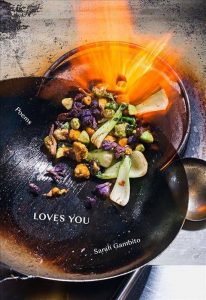“We were talking about the difficulties we were sharing, and also the beautiful accords that can occur when you can be your full self when others accept you and your work. Often writers of color are in places where they can literally be policed. People will say ‘No, you shouldn’t use Spanish here,’ or ‘Someone’s grandmother really wouldn’t say that,’” she said.
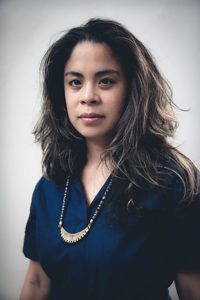
“So, it’s about thinking about the freedom that could exist within an Asian American space.”
After 14 years at the Rose Hill Campus, Kundiman, the nonprofit organization dedicated to nurturing writers and readers of Asian American literature, has expanded to include students at Fordham’s Lincoln Center campus.
For the past four years, Kundiman has hosted Fordham College at Rose Hill students in paid internships that were funded by the University.
Paid Internships
This summer, when the time came to renew the partnership, Maura Mast, Ph.D., dean of Fordham College at Rose Hill, and Laura Auricchio, Ph.D., dean of Fordham College at Lincoln Center, teamed up to contribute funding for the internships. In June, the first four FCLC students began working with Kundiman, which promotes artists through workshops, lectures, performances and an annual retreat.
For Auricchio, the partnership was appealing because it offers Lincoln Center students an intellectual, educational opportunity that also gives them real-world experience and networks. It also contributes to the college’s anti-racist initiative.
“That took on particular urgency last year as we were seeing an increase in attacks and anti-Asian hate crimes thanks to misunderstandings about COVID-19 that were sometimes blamed on people of Asian descent,” she said.
“It’s about artists who are fully engaged in making the world a better place, so its fully living Fordham’s mission of being people for others, making art for the others, and having a transformative impact on the artists themselves and the community beyond.”
Practical Skills and a Warm Community
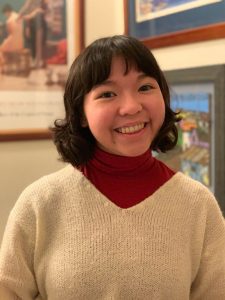
Bea Mendoza, a senior at Fordham College at Lincoln Center who is majoring in psychology and English with a creative writing concentration, began interning at Kundiman last summer as an operations intern. This fall, she joined the grants-writing team. A poet herself whose family hails from the Philippines, Mendoza has both participated in classes held by the group and helped coordinate them. She’s found the process of learning to write grants to be especially gratifying.
“It’s been such a warm community to be a part of,” she said.
“Interning with Kundiman has really opened my eyes to how much I want to continue working in literary nonprofits and to stay in the literary world.”
Stefan Valenti graduated in December from Fordham College at Lincoln Center with a degree in new media and digital design and a double minor in psychology and marketing. He began working with Kundiman as a communications intern in the fall, and has stayed on as an intern this spring.
“The idea of going into the workforce is a little intimidating because you’re never really sure of the culture you’re going to walk into, but Kundiman has been very supportive and understanding of newer workers,” said Valenti, whose father is Italian and whose mother is Indian.
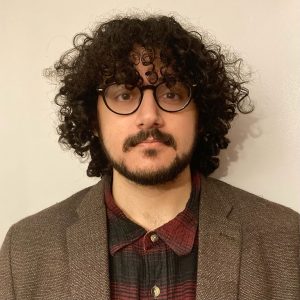
“I feel like this position really strikes a balance, because it allows me to be creative through copy writing and graphics, but I’ve also learned practical skills I can use for marketing or advertising.”
Valenti also said working with Kundiman has also widened his perspective about writing. A recent reading of Monsters Under the Bed by the poet W. Todd Kaneko, a Kundiman fellow, was especially compelling.
“The whole world of poetry is something I wasn’t into before, but after reading some of the fellows from Kundiman, I’ve opened my eyes a little bit. There are some poems where I read them, and I still don’t know what I’m supposed to be getting, but then there are other poems where I read it, and I say, ‘Oh, that is objectively good, I understand this,’” he said.
An Understanding of Nonprofits
Mast said funding student internships at Kundiman was a no brainer, given how much of a difference the group makes through programming geared toward high school and college students .
“I also think of the high school students who they work with, who have this first exposure to a Asian poet or fiction writer. For them to see themselves means they can see their future. That has a tremendous impact,” she said.
At Fordham, she said, “they’ve really brought those students into understanding how nonprofits work, with the fundraising, the publicity, the working with donors, but also building the community.”
She agreed that the partnership was an example of better coordination between her and Auricchio, similar to the Cultural Engagement Internships program that kicked off in May.
“Our students see themselves as Fordham students first, then they see themselves as Fordham College at Rose Hill students, and of course they have a campus identity, and that’s terrific,” she said.
“But we are one faculty of arts and sciences, one curriculum of arts and sciences, and I think the partnership I have with Laura has inspired me to think differently about programs supporting our students. We’re a good creative team, and when we work together, we’re able to do so much more because we’re able to build off each other.”
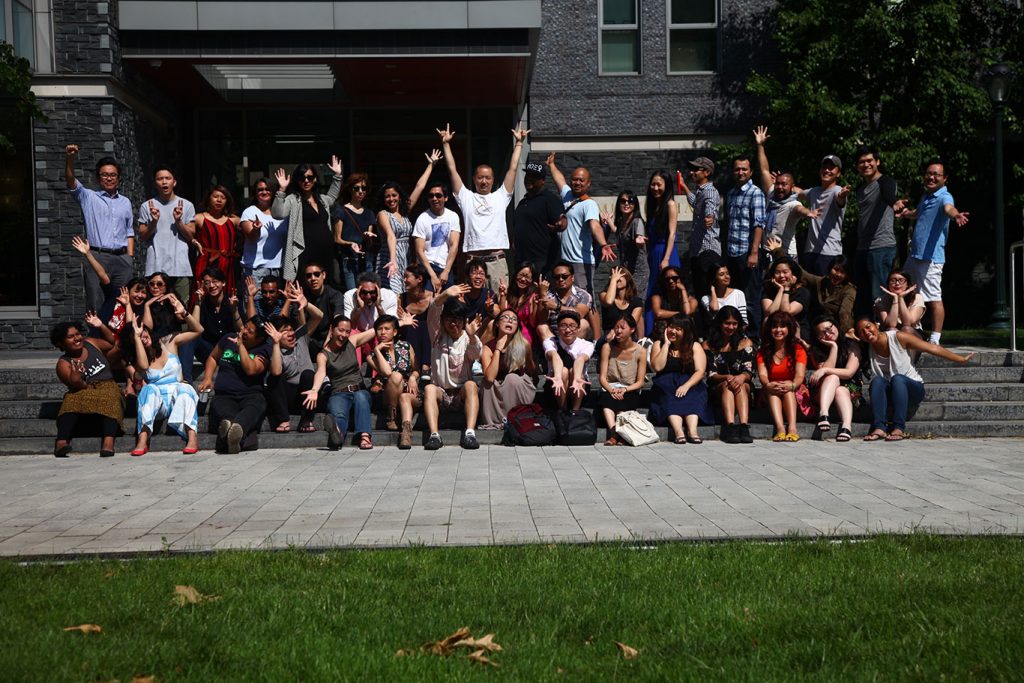
“It was so lovely to have this moment of true connection with other attendees who were Zooming in from across the country and even the world. Seeing the beautiful words of everyone in the chat fly up across the screen was incredible,” said Shannie Rao, a junior English major at Fordham College at Lincoln Center. “As a student, the opportunity to be in a virtual room with so many different attendees—including some who were established poets—and all bring our most authentic selves to the writing prompts felt like such a gift.”
The festival, held in honor of National Poetry Month and in support of Demos, a think tank that promotes an inclusive and mutiracial democracy, featured six award-winning poets who served as the evening’s “poet guides”: José Felipe Alvergue, Tamiko Beyer, Chen Chen, S. Brook Corfman, Carolyn Forché, and Aracelis Girmay.
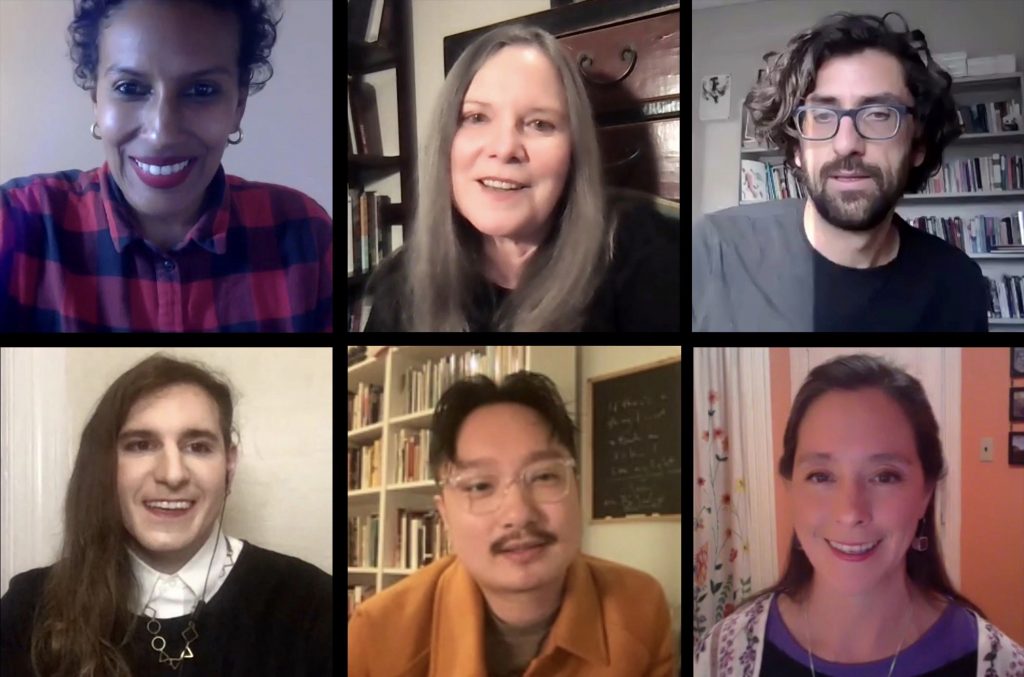
Each poet guide shared their favorite poems and intimate stories from this past year. Girmay recited a poem that helped her heal after father died in August. Alvergue recalled the day he told his neighbors how he felt about their new Trump/Pence 2020 campaign yard sign, standing a few yards away from his own Biden/Harris sign, and how he overheard them say, “Must be one of those illegal immigrants” as he walked away.
“I was so moved by all the poet guide’s meditations and poems,” said Mason Rowlee, a junior at Fordham College at Rose Hill who studies English and journalism. “It’s so difficult to focus and center yourself in the present with so much going on, and this festival is a great reminder of the importance of slowing down, taking a breath, and opening yourself up to being vulnerable.”
The six poet guides each offered a writing prompt to their virtual audience, who had several minutes to type responses in the Zoom chat. With the guidance of their host, Fordham professor and Director of Creative Writing Sarah Gambito, the audience completed their poems. Then they simultaneously hit the return button on their computers and released a flood of responses.
The Most Challenging Apology
One prompt asked attendees to think about the most challenging apology they could give or receive. The responses were powerful. One person apologized to their half-brother who died before they were able to meet “eye-to-eye, blood-to-blood, as halves.” Another apologized to their “long disabled daughter who has been quarantined for almost 30 years.” Several people apologized on behalf of their white slaveholder ancestors.
Many apologies related to the pandemic. One person demanded an apology from every white friend who had told them they were imagining increased hostility toward them as an Asian American, especially during the early days of the pandemic. Another asked for an apology for all the lives that could have been saved by wearing masks.
An Accidental Gift from COVID-19
The final poet guide, internationally renowned poet Carolyn Forché, reflected on life in the pandemic and asked the audience to write a poem of gratitude.
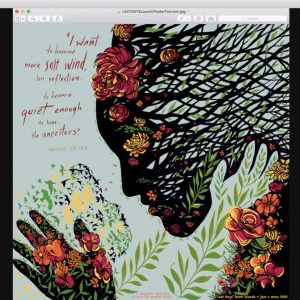
“We endured this as an entire species, all at once, all over the world. We came through this as human beings together. Not in living memory has this happened to the whole of humanity,” Forché said. “May we never lose sight of what we have been shown, that we share our Earth, sapphire and pulsing and alive.”
Guests said they were grateful for freshly planted lavender, for a pet who lived longer than doctors had expected, for a lover found on Tinder, for the COVID-19 vaccines and the scientists who developed them, and hundreds of other things.
“For lungs that work; for good bagels baked fresh; for fresh flowers from the bodega around the corner; for the guy at the bodega who always remembers me even with my mask on; for my dog; for poetry; for poets; for the little dust particles floating in a shaft of sunlight; for sunshine on my face; for the sharp bite of winter air when i breathe in; for museums; for chewy noodles; for my mother’s laughter; for life,” typed one guest.
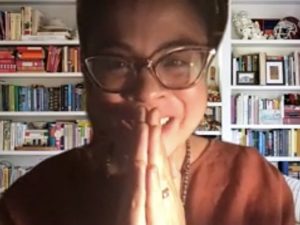
At the end of the evening, the guests thanked their poet guides and hosts. “I am so grateful for all of you—for the vulnerability, for the hope,” typed one person. “A gift of Covid for sure—such an event could not have existed otherwise,” wrote another. They left the event with a unique souvenir: 89 pages of their collective poetry from the saved Zoom chat.
“I’ve always known that poems are alive, but it’s moments like this when we can see the poem materialize … I’m just in awe of you and of this,” Gambito said. “It’s your poem. It’s our poem.”
The festival was co-sponsored by Fordham College at Lincoln Center’s dean’s office, the Office of the Chief Diversity Officer, and several organizations outside Fordham.
]]>For the past five years, Fordham’s creative writing program has hosted the Golden Gloves Literary Competition, an annual event where creative writing classes from the Rose Hill and Lincoln Center campuses present their literary pieces and compete for prizes. But this school year, with a new name, the event struck a different tone.
“We wanted creative writing to act as an opportunity for community building as opposed to competition … We wanted all our classes’ stories to be celebrated in equal measure,” Sarah Gambito, an associate professor of English and director of the creative writing program at Fordham, explained in an email.
On Dec. 6, nearly 150 students and faculty members gathered in Lowenstein’s 12th-floor lounge to retell the stories they had written this past semester.
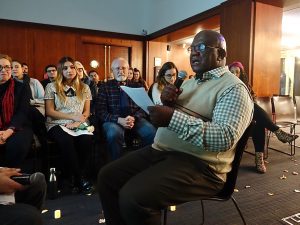
The event began with a story from Fordham’s second Writer at Risk in Residence: Felix Kaputu, Ph.D., a scholar from the Democratic Republic of Congo who arrived at Fordham this past October through a collaboration that gives writers a “free, safe place to live, work, and write without the threat of violence from their home countries” for two years, according to the program’s description.
Kaputu spoke about life in his native Congo, from the political environment to how his father and uncle shaped his identity as a storyteller. In 2006, Kaputu was falsely accused of participating in anti-government activities and jailed in solitary confinement.
Below is an excerpt from Kaputu’s piece shared at the Story Circle:
“My father, who was working as the catechist for the Catholic Mission, had an extraordinary talent as a storyteller of a particular kind. However, he would not use his talent for tales, legends, epics, and other oral narratives that had well-known narrators. They produced their stories in royal courts with a big group of musicians and drumbeaters. My father had the talent to make, keep the suspense, and talk about his personal life, and encounters. His stories included running from both the local and neighboring countries’ police. A famous story was about fighting a lion from a hut where he was hiding from the police. Another narrative was about moving from Congo to neighboring countries using a bicycle to celebrate life with the locals sharing the same culture. However, he would run back to the Congo whenever the locals would find him too much seductive of their women. He had more stories of that kind. Then, my uncle, a professional hunter, had a significant influence on me. I lived with him a couple of times during school vacations. He shared with me traditional knowledge and curing diseases with medicinal plants. He taught me how to interview community leaders and wander in the forest at night without being lost.
That background has made me strong over the years. I learned to resist when condemned for prison without reason, and I easily travel around the world as a scholar and writer at risk without remorse.”
This semester, Kaputu taught a creative writing class at Fordham.
“It means a lot to me,” Kaputu said. “One of the most important things I like in my life … is [teaching]. There is nothing else in the world, I think, I like [more than] being in class with students … They learn from me, I learn from them.”
Eight students also presented work from their creative writing classes. They took turns and sat in pairs, facing each other. Surrounding them were their classmates and mentors, along with flower petals and yellow candles on the carpeted floor. For more than an hour, students retold personal experiences from their lives. After each student spoke, the next speaker gave them a wish relating to their story, like “I hope that you are always surrounded by the ones that you love,” said Gambito.
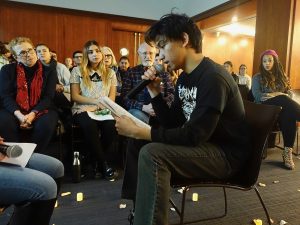
Among the student speakers was Patrick Raneses, a senior English major and theology/creative writing minor at Fordham College at Rose Hill, who read a piece he wrote about his grandfather for Luminous Details, a graduate-level creative writing course.
Below is an excerpt from Raneses’s piece, “Some memories”:
“I remember when I was back home one summer and you and I were sitting on the ugly orange couches in my living room. Mom wanted you to visit, because you were getting stupid old. We were sitting there, silent. You were penning a letter while I was flicking through something on my phone.
Unprompted, you turned to me and started telling me this story about when you were in the Philippine Army during World War II, you were a cook and you weren’t much younger than I was. And when you were carrying a tray of food from one barrack to another, a Japanese soldier rushed you and buried his bayonet into your gut.
You lifted your shirt and started laughing: I stared at the striated patterns of flesh that was your marbled torso and I tried looking for the scar. I think I saw it there in the folds. I smiled, saying that was amazing, because I thought it was at the time, even though that’s a strange way to describe a thing like that. You giggled, too, and stared at me with your giggling eyes.
Then you turned back to write your letter. About ten minutes later, you started telling me when you were in the Philippine Army during World War II, you weren’t much younger than I, a man gutted you. I told you that was amazing, again. You looked at me, again, with your giggling eyes, and you told me, dementia is like hell.”
Raneses said he realized he was a writer in the first creative writing class he took at Fordham, nearly a year ago.
“I really identity myself as a writer, in the same way that I am an Asian American,” Raneses said. “I am a writer because I have to write. It’s like a release valve. It’s therapeutic in a lot of ways … It forces me to challenge myself, whether that means confronting certain truths or hard things.”
Camille Hermida-Fuentes, a junior English major at Fordham College at Lincoln Center, wrote about her grandmother Alicia—the “unluckiest” person she said she knows.
Below is an excerpt from Hermida-Fuentes’ piece, “Carcassonne”:
“Alicia had really, really bad luck. In 1985, she was at an art museum in D.C., with her son and daughter. Her son said, “Alicia, look at this painting”, so she turned around and then she was collapsing, and then she was waking up in a hospital and they were telling her it was cancer. Multiple myeloma. The kind that clings to your bone marrow for its life. The kind that doesn’t go away. And it didn’t. For 27 years, it didn’t go away. Doctors said it was a miracle but there was nothing miraculous about her life, about how she was always collapsing. Once, she tripped over her own feet on her way to the bathroom in the middle of the night and caught pneumonia because of the angle her broken shoulder bones forced her to stay in, pushed liquid into her lungs.”
For Hermida-Fuentes, a self-described “shy” person, storytelling helps her to convey her emotions.
“I truly love telling stories … I feel like when I write, I’m finally getting to say what I want to say,” she said. “And there’s something really cool about being able to create your own kind of world when you write.”
She said the Story Circle—her first-ever public reading of work—was also an opportunity for healing.
“This is a story I’ve been having a hard time telling. There’s a lot of complicated feelings and guilt,” Hermida-Fuentes said. “It was very healing to have everyone that I know from class there to support me.”
]]>These words, taken from the poem “Thunderdome” in Sarah Gambito’s new book Loves You, evoke the kind of nourishment the poet hopes readers will find in her work.
In 96 pages of poems, Gambito, an associate professor of English and director of the creative writing program at Fordham, presents a gamut of personal life experiences: how Filipino Americans—and people of color—are assailed and fetishized; the struggle to hold on to cultural identity as an American-born child of immigrants; the nuances of everyday life; and what it’s like to be the mother of a biracial child. But her book has a tasty twist.
Loves You is part poetry, part cookbook. Her poems are divided among five flavors: umami, sour, salty, bitter, and sweet. Most of them reference food in some shape or form. (Example: “When God was Filipino, / he put a pig and fire together and called it porkissimo.”) And her poems give readers a taste of not only her life but also her actual cooking. There are recipes for family favorites—salmon sinigang, barbecue scepters, watermelon agua fresca—scattered throughout the book.
Her ultimate goal? To nurture strangers with her words—to make people feel, she says, even if they are occasionally puzzled by her poems, published by Persea Books on Jan. 22.
“I want people to feel nourished. I want people to feel provoked. I want people to feel … a little freaked out,” she said, laughing a little. “I don’t see it as sort of just a sweet book. There’s anger here, as well. But I think anger can hold equal footing with joy and creation, and with thinking about community and family.”
In her poem “Don’t Eat Filipinos!” Gambito speaks about the subtle symbolism of a biscuit called Filipinos. The controversial cookie is sold in Spain—a country that controlled the Philippines for years.
“To name it after a people, a country that was colonized for 400 years … I really thought it was a joke,” she said. “Literally, it’s like you have Spanish people eating Filipinos.”
As an antidote, the page after that poem lists her husband’s recipe for lychee macarons.
“The epigraph is instead of eating Filipinos, eat these,” Gambito said. “The idea is to be thoughtful about what we’re doing, what we’re putting into our bodies—what it means.”
Gambito’s new poetry book also melds meals with motherhood. Her poem “Hapa,” defined as a person who is partially Asian or Pacific Islander, is about her 8-year-old son. He was born with blonde hair and blue eyes—a stark difference from his Filipina mother. Strangers would mistake Gambito for his nanny. She felt like they were “othering” her from her own child, she said. “Orangutan nanny in the garage / my pleasure—a disappointment,” she wrote in “Hapa.”
Gambito mentions a more universal aspect of motherhood—the joys and fears of being a mother. In the poem “First Born,” she writes, “Basically: my wish is that you are never, never pierced through the heart. / My aim is ordinary. / My anthem open. My berries gasping together in pie.”
Those last six words describe the feeling of being breathless, she said. “You want to provide. You want to give your son beautiful, sweet things, and you feel like always short to the task.”
Loves You is Gambito’s third published collection of poetry. This book was 10 years in the making, she said. But back in the book’s infancy, she recalls sitting at a ramen shop with a friend, pondering over the purpose of her new poetry collection.
“What do you think poetry should do?” her friend asked.
“It should do this,” Gambito said, cradling her warm bowl of broth with her hands. “It should nourish you from the inside out.”
Text of Gambito’s poem “Holiday” in Loves You:
Crashing across cousin stars with deep listening holes. Because we’re
related and every wren that has nested abroad would like to become
my mother. I’d like to lie flayed open upon her twelve breaking torsos.
This blood would weld us to the chair and I’d let a crowd in. I’d always
thought that crowds were created in a panic. A great anti-system of
people fleeing fire. Rather crowd dynamic is cultivated because you
run towards. You want concert tickets or something to do the day after
thanksgiving. They’re almost giving it away. This is what she says as
the gold metal hits the outline of her. She says I want you to find me. I
want that you never give up and you find me.
]]>It all began with a professor named Sarah Gambito, an award-winning poet and director of Fordham’s creative writing program. She had heard about Yale’s most popular class of all time—Psychology and the Good Life, a college course designed to teach students how to have a happier life. She thought it was something she could bring to Fordham.
But Gambito’s class, titled The Good Life, has a different take on happiness. Through twice-weekly lectures, Gambito taught 16 students how creative writing can spark a deeper sense of personal well-being—and vice versa.
“The point is how can creative writing help usher us into a greater—a better—sense of living?” Gambito said. “It’s been said that a good life is a creative life.”
Yoga, Succulents, and Adventures in the Bronx
At the beginning of the semester, Gambito gifted each student with a small green succulent. Over the next few months, the students fed and watered their succulents, took notes about their development, and watched their plant babies grow.
“Taking care of yourself is like taking care of a plant,” she explained. “You have to nurture yourself.”
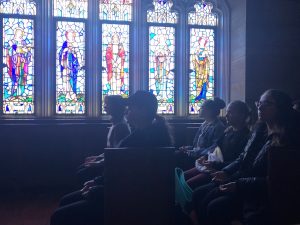
In the classroom, they took a meditative approach toward the creative writing process, drawing on the four main goals of life in the Hindu religion: dharma (truth), kama (joy), artha (prosperity), and moksha (liberation). For one class session, they gathered at the McGinley Center for an afternoon of yoga, contemplation, and freewriting about their meditation experience. After a few rounds of yoga, they draped Korean white sheet masks across their faces, lay on mats and towels, and listened to a soothing, instrumental music playlist on Spotify. The idea was to quiet their bodies and listen to that small, still voice deep inside, said Gambito—a voice that’s often eclipsed by the noise of our everyday responsibilities.
Their expeditions also extended beyond the campus. Gambito sent them on a scavenger hunt through the New York Botanical Garden, where they free wrote about the flora and fauna. Another day, they visited Egidio Pastry Shop, a mom-and-pop store a few blocks from the Rose Hill campus, and reflected on their dining experience via Google reviews.
“Part of what it means to be a creative writer is to get out of the classroom and to be involved with your community,” Gambito explained.
Storytelling Over A Shared Meal
On their last day of class in Keating Hall, Gambito and her students shared a potluck supper.
Their classroom windowsill was laden with goodies baked or bought by students: vegan monkey bread, mini pizza bagels, empanadas. Gambito herself bought five pies from Bella’s Pizza, the place with “the best pizza in the Bronx,” she declared to the class—according to Google, that is.
As they ate, the students spoke about experiences that helped them become better creative writers or thinkers. Some brought meaningful objects: a drawing from a student’s favorite book, pencils tagged with poems on small slips of paper, homemade Irish soda bread, a student’s first published story for a Fordham student journal.
Then there was Fia Swanson, FCRH ’21, who brought in her most valuable piece of jewelry—a simple pair of bronze-colored, chandelier-style earrings. She asked her peers to guess who gave them to her.
“In popcorn style, yell out your first guess,” she said.
“Mother.” “Grandparent.” “Boyfriend.” “Best friend.” “Godmother.”
“Yourself!” someone said, as people laughed.
“Actually, my therapist gave me these,” Swanson answered.
In her senior year of high school, Swanson’s father contacted a therapist for her named Dr. P. She didn’t have time for any more clients. So without telling his daughter, he sent Dr. P something that Swanson had written: a personal essay about her identity, being biracial, and her childhood.
“She read it, and said, ‘I read what you wrote, and I just had to meet you,’” Swanson recalled. “I couldn’t believe it was my writing that would get me the therapy that changed my life.”
On the day of her last session with Dr. P, Swanson’s face was covered in tears.
“She hugged me that day, and I broke down crying like I never had before,” Swanson said. “When my father came to pick me up, she jokingly said to him, ‘She’s gonna write my book for me someday.’”
The last presenter, Haris Basic, FCRH ’21, recalled memories with his best friends of nine years, like watching a zombie movie together at one in the morning and reminiscing about their high school days during a six-hour car drive to Buffalo, New York.
“I wish they were here to hear you talk about that,” said a student. “Because it was just so beautiful.”
“They would roast me,” Basic said, as the rest of the class erupted into laughter.
As he finished his presentation and the class began to applaud, he suddenly broke in.
“Wait, wait … I wanted to thank you all and Professor Gambito for being people who have inspired me to explore my creative side through writing,” he said. “Thank you all for being open and accepting.”
Finding Community Among Writers
In the final minutes of their last class, Gambito’s students reflected on what they’ve learned. Through workshopping each other’s work, the students say they learned that writing a good piece is a group effort. But perhaps most importantly, the course has shown them the importance of caring for both their mind and body. By becoming more in touch with their emotions and their body, the students say they have developed a crucial skill for good writing—being more vulnerable in the stories they write.
“The greatest text you can think about is the text of your life. And for you to be an author of that, for you to feel agency and empowerment [is very important],” Gambito said. “Sometimes that’s easy to forget—that you are the architect of the stories that you’re able to tell.”
The Good Life will be taught again next fall.
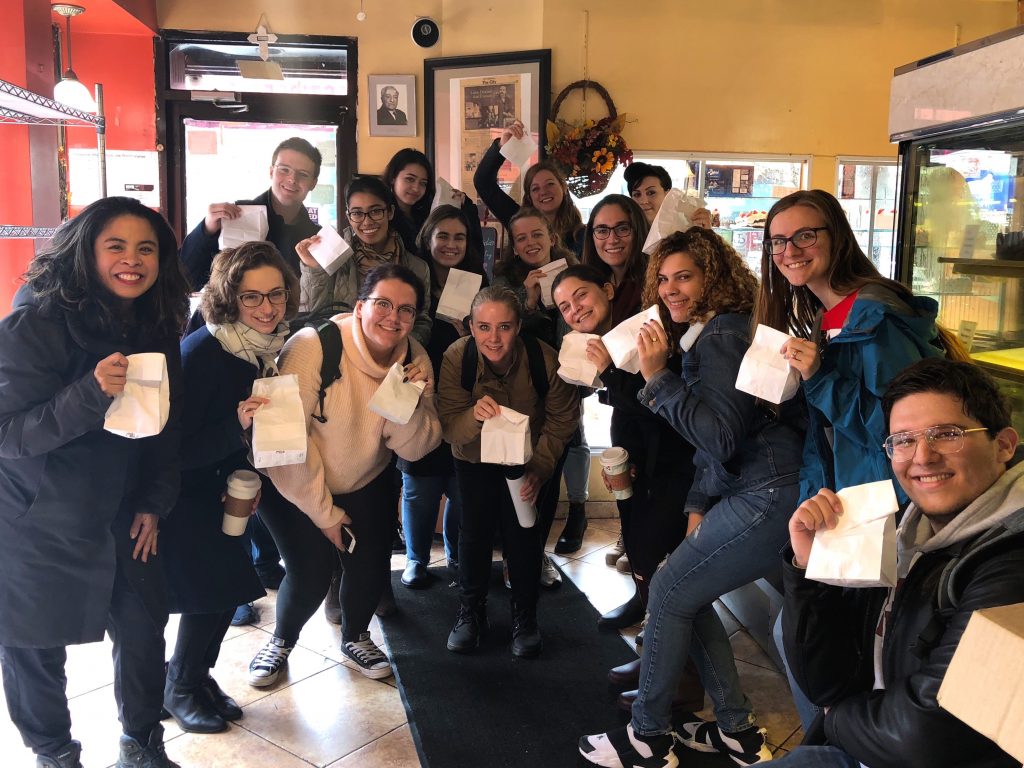
“When God was Filipino, / he put a pig and fire together and called it porkissimo.”
The line—an excerpt from the poem “I Am Not From The Philippines”—was written by Sarah Gambito, an associate professor of English and director of the creative writing program.
It was, to her knowledge, the first time her work had been used in a restaurant review, though it was not the first time food had infiltrated her poetry and prose.
“I remember having a very delicious bowl of ramen with a friend, and saying, ‘What if a poem could be like this bowl of ramen on a cold, cold day? You know, carbs and broth and complete comfort,” she said.
“I’m interested in the idea of how that can happen in words.”
The theme of hunger comes up a lot in her work because she writes often about the immigrant experience. Her parents emigrated from the Philippines to the United States, and she grew up in Virginia, before moving to New York in 1995. Because she never lived in the Philippines and left Virginia so long ago, the concept of home is very much on her mind, she said.
A trip to the Philippines in 1999 on a faculty fellowship—her first as an adult to the country of her ancestors— made her realize she has many homes.
“The idea of feeling at home in multiple places is a different kind grace that I didn’t realize I’d have access to either,” she said.
“Much of my writing has been about the anguish of feeling displaced and the anger around that. I’m ready to also look at the other side of it, because I may not have a capital “H” home, but I have these lower case “h” homes in many places that I look.”
Having already published two collections of poetry, Matadora (Alice James Books, 2004) and Delivered (Persea Books, 2009), Gambito is currently at work on a new one, tentatively titled Virginia. It’s still unclear what form it will take, she said, but chances are that food will play a factor.
“There’s a great quote from the poet Lin Yutang: ‘What is patriotism but the love of the food one ate as a child?’” she said.
Gambito came to Fordham in 2008, and in 2011, she became editor of Cura, Fordham’s literary magazine. The magazine, which is a collaboration among the faculty, the public, and students, publishes twice annually online. This school year’s theme, “Black Lives Matter,” was chosen in response to the recent racial bias events both on campus and off.
“Speaking with students, we said ‘We can do something about this. We don’t have to just observe. We can act as artists and encourage a voice against this action,” she said.
Claudia Rankine, whose book Citizen: An American Lyric (Graywolf Press, 2014) was a finalist for the National Book Award in Poetry, will help to edit the Fall 2015 and Spring 2016 issues. Gambito teaches Citizen in her classes. She says one of the biggest challenges she faces is convincing students that the book, which recounts racial aggressions in encounters in daily life and in the media, is written for them, no matter what their racial background.
“We want to collect student voices from both campuses and feature them alongside the pieces we’re finding from members of the public. Poetry, fiction, some fantastic digital creative writing, creative nonfiction, visual arts; it runs the gamut,” Gambito said.
“It’s an issue for all of us to pay attention to.”
The Fall 2015 issue of Cura is being published at the end of the year, and is drawing some of its material from art coming from within the creative writing workshops. As such, Gambito is adamant that students are present for the workshops.
“It’s not just the poems that they bring in, or their stories, but it is what we co-create together. Sitting and speaking to each other is another kind of art. So I tell them, the workshop is mandatory,” she said.
“If you’re not here, we miss what you could have said. We miss what we could have created as a class,” she said. “I don’t make distinctions between writing and critiquing. We’re creating together, we’re imagining together what a poem can be.”
]]>
Sarah Gambito, assistant professor of English and the new director of creative writing at Fordham, was awarded one of three Barnes & Noble Writers for Writers Awards for service to the literary community.
Gambito is the co-founder of Kundiman, a nonprofit organization that promotes Asian-American poetry. She is the author of Matadora(Alice James Books, 2004) and Delivered, forthcoming from Persea Books. Her poetry has appeared in The Antioch Review, Fence, Field, The New Republic and other journals. She is the recipient of grants and fellowships from the New York Foundation for the Arts, the MacDowell Colony, and Urban Artists Initiative.
Russell Banks and Robert Caro are the other two recipients of the 2009 Barnes & Noble Writers for Writers Awards, and Daniel Halpern is the recipient of the inaugural Editors’ Award. Poets & Writers established the Writers for Writers Award in 1996 to recognize authors who have given generously to other writers or to the broader literary community. The title of the awards has been given to Barnes & Noble in appreciation of its sponsorship of Poets & Writers. The awards will be presented at the Poets & Writers annual gala benefit, In Celebration of Writers, on March 25 in New York City.
“If you’re an MA/creative writing, please clear your calendar for this. If you’re a scholar interested in modern poetry, ditto. And anyone else interested—please take advantage of this great opportunity!” writes Mary Bly, associate professor of English.
Fordham University students interested in attending the Forum, November 6 to 8, 2008, should contact Emily Hunt at (212) 274-0343 ext. 10, or [email protected]. Students interested in attending all of the events, including the Poetry Walking Tours reserved for All-Events pass holders, can purchase an All-Events Pass at the discounted student price as well: $85. There are a limited number of these special student tickets available, and they are selling rapidly.
Poets Forum Reading
Thursday, November 6, 2008 | 7 p.m.
The Times Center, 242 West 41st St., New York City
Some of the most acclaimed poets of our day read together on one stage. Participants include Frank Bidart, Victor Hernández Cruz, Louise Glück, Lyn Hejinian, Sharon Olds, Ron Padgett, Carl Phillips, Robert Pinsky, Kay Ryan, Gary Snyder, Gerald Stern, Susan Stewart, Ellen Bryant Voigt, C.K. Williams, among several other highly acclaimed poets.
$10.00
Poets Awards Ceremony
Friday, November 7, 2008 | 7 p.m.
Tishman Auditorium, The New School
66 W. 12th St., New York City
Celebrate contemporary poetry and the recipients of the premier collection of awards for poetry in the United States. The night will include readings and presentations by Lucie Brock-Broido, Henri Cole, Louise Glück, Eamon Grennan, and Brigit Pegeen Kelly.
Free
Poets Forum: Discussions of Contemporary Poetry
Saturday, November 8, 2008 | 10 a.m. to 4 p.m.
Eisner & Lubin Auditorium, New York University
60 Washington Square South, New York City
Some of the most important poets of our time explore questions central to poetry today. Participants in the four intimate panels will include Frank Bidart, Victor Hernández Cruz, Louise Glück, Lyn Hejinian, Sharon Olds, Ron Padgett, Carl Phillips, Robert Pinsky, Kay Ryan, Gary Snyder, Gerald Stern, Susan Stewart, Ellen Bryant Voigt, C. K. Williams, and moderators Timothy Donnelly, James Longenbach, Maureen McLane, and Tree Swenson.
$60.00 only $35.00 for students!
American Poet Launch Party
Saturday, November 8, 2008 | 7 p.m.
The New School, Wollman Hall
5th Floor, Room 550, New York City
Reading and reception for the new fall issue of American Poet, the journal of the Academy of American Poets. Charles Bernstein, Major Jackson, and Cecily Parks will read from their work.
$5.00
